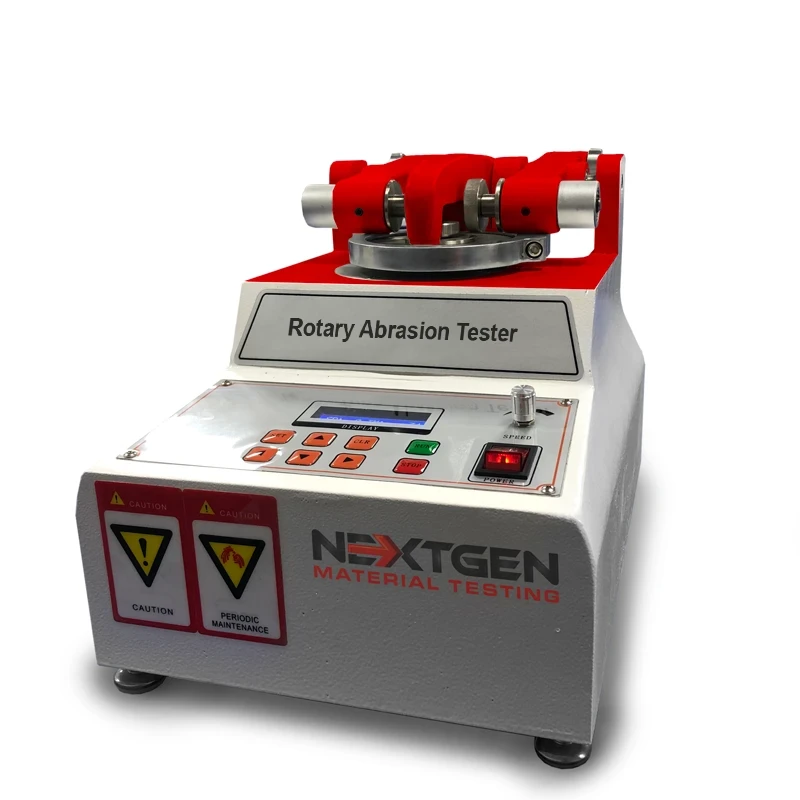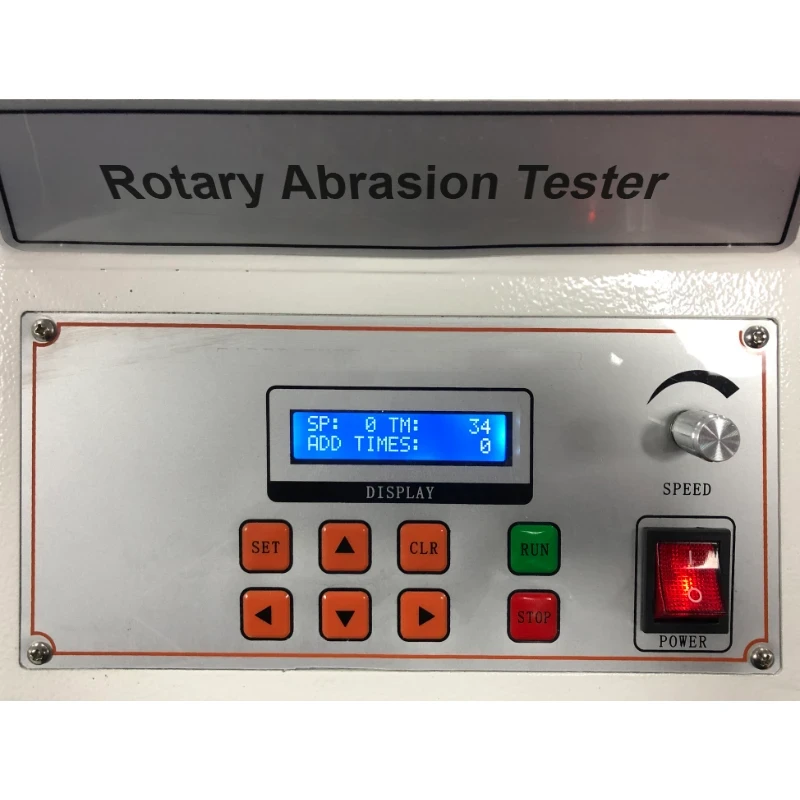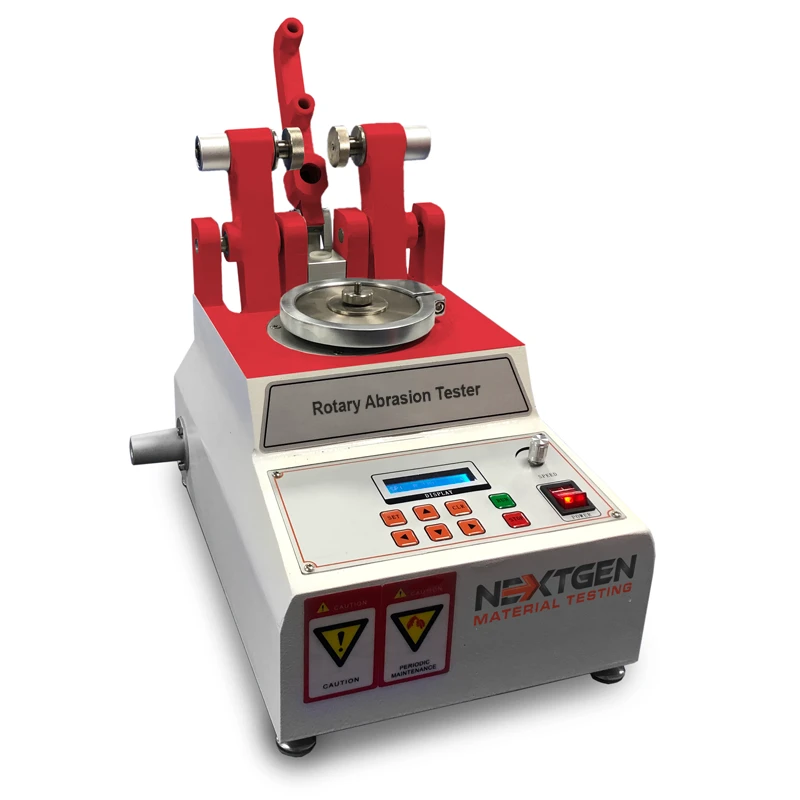Rubber Testing Equipment
Standards
ASTM D1044, ASTM D3884, ASTM D4060, ASTM F1978, DIN 53754, DIN 53799, DIN 53109, DIN 52347, ISO-5470, ISO-7784-2, ISO 9352






Description
GenRotary is NextGen's Rotary Abrasion Tester is widely used to evaluate wear resistance. It can conduct tests on a wide range of materials such as: cloth, paper, paint, plywood, leather, tile, glass, rubber etc. It tests the specimen by rotating it while in contact with the grinding wheel and applying the required pressure. The Loss of weight reflects on the change in weight of the specimen. The unit also comes standard with an intelligent power failure recovery function.
The test applies to material thicknesses between 6.35mm to 40mm. A flat square or round specimen of roughly 100mm is mounted on the system which rotates at a fixed speed vertically. Rotary's wheels are lowered onto the material at a specific pressure. The X pattern of abrasion produced by the double rotary action allows for an accurate identification of the materials' wear and tear. The Rotary abraser comes standard with a full range of auxiliary weights, specimen holders, abrasive wheels, wheel refacer and vacuum unit.
Technical Specifications of Rotary Abrasion Tester Single Wheel
| Specimen Size (Outer Diameter) | 108mm ID:8mm ,3mm |
| Abrasion Wheel | 2"(max.45mm), 1/2"(W) |
| Wheel Center Distance | 63.5mm |
| Rotating Speed | 60/72 rpm |
| Loads | 250g, 500g, 1000g |
| Counter | LCD Touch screen, 0-999,999 Automatic shutdown |
| Wheel and Specimens disk center space | 37-38mm |
| Machine Size (L*W*H) |
20.86" x 12.60" x 12.20" 53cm x 32cm x 31cm (Including vacuum cleaner) |
| Weight (kg) | 40 lbs / 18kg (Excluding vacuum cleaner) |
| Power | AC110V / AC220V/50Hz |
| Wear index calculation formula | Abrasion loss weight/test turnover number x1000 |
Rotary Abrasion Tester Dual Wheel
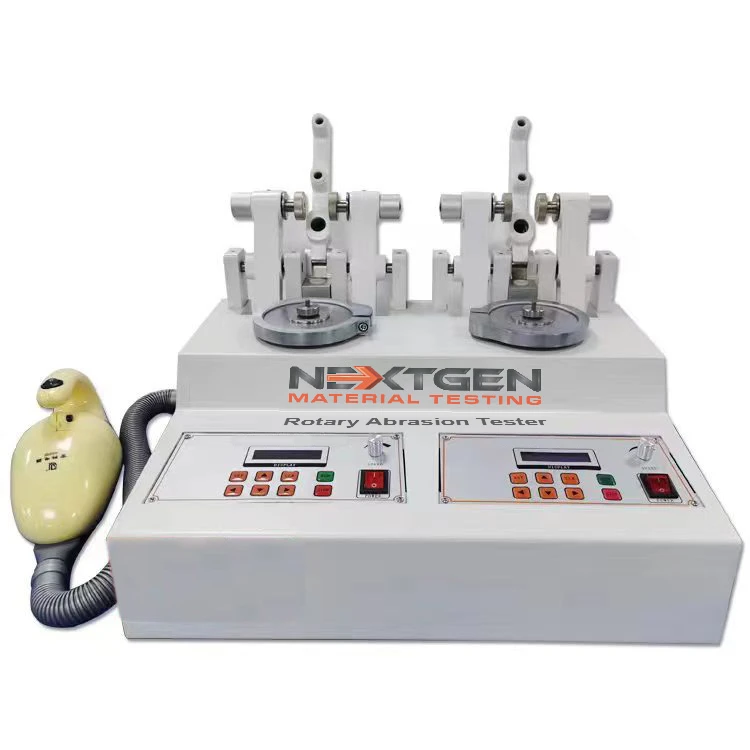
The dual wheel abrasion tester is suitable for testing a variety of materials such as fabrics, paper, coatings, plywood, leather, floor tiles, glass, and natural plastics, among others. The testing procedure involves positioning a rotating specimen between a pair of wearing wheels and applying a specified load. As the test material rotates, it impels the wearing wheels to cause abrasion on the test material. The weight loss resulting from the wear is determined by the difference in weight of the test material before and after the test.
Rotary Abrasion Tester Dual Wheel Features
- Unique wear process:
The distinctive wear process entails placing the test material on a turntable, where two grinding wheels exert a specific weight on the material to induce wear. As the material wears, the surface goes through all-around particle abrasion, forming a complete circular pattern. The grinding wheel spins along with the spinning sample plate, causing them to move against each other, which gradually wears away the material.
- Simulating Real-World or Standard Testing Conditions:
This testing machine can mimic real-world usage conditions or follow specific testing standards. It offers the flexibility to choose from different wear materials and accessories for various tests. Moreover, it allows you to select from two speeds (60 and 72 revolutions per minute) and three different loads.
- Vacuum Cleaning for Removing Debris:
A vacuum pump's suction arm is connected to an adjustable part at the back of the machine through a hinge. This allows you to easily adjust the height to match the thickness of different samples.
Technical Specifications of Rotary Abrasion Tester Dual Wheel
| Specimen Size (Outer Diameter) | 108mm ID:8mm |
| Abrasion Wheel | 2"(max.45mm), 1/2"(W) |
| Wheel Center Distance | 63.5mm |
| Rotating Speed | 60/72 rpm, adjustable |
| Loads | 250g, 500g, 1000g |
| Counter | LCD Touch screen, 0-999,999 Automatic shutdown |
| Wheel and Specimens disk center space | 37-38mm |
| Distance between test piece and vacuum cleaner | 3mm |
| Machine Size (L*W*H) |
35.5" x 27.5" x 16.5" 90cm x 70cm x 42cm |
| Weight | 132lbs / 60kg |
| Power supply | AC 110V, 10A |
FAQs
ASTM F1978 is a standard test method for "Measuring Abrasion Resistance of Metallic Thermal Spray Coatings by Using the Taber Abraser" & evaluating the abrasion resistance of materials used in protective clothing worn by workers exposed to hazards such as cuts, punctures, and abrasions, ensuring their effectiveness and reliability in safeguarding against occupational risks. (ASTM.org)
Our Rotary Abrasion Tester Single & Dual Wheel complies with ASTM F1978 standard. Click here to request an online quote.
ASTM D4060 is a standard test method for "Abrasion Resistance of Organic Coatings by the Taber Abraser" evaluating the abrasion resistance of coatings and similar materials, offering essential protocols for assessing their durability and performance in various environments and applications. (ASTM.org)
Our Rotary Abrasion Tester Single & Dual Wheel complies with ASTM D4060 standard. Click here to request a free online quote.
ASTM D1044 is a "Standard Test Method for Resistance of Transparent Plastics to Surface Abrasion by the Taber Abraser" established by the American Society for Testing and Materials (ASTM) to assess the abrasion resistance of materials, providing essential guidance for evaluating their durability and performance in various applications. (ASTM.org)
Rotary Abrasion Tester Single & Dual Wheel complies with ASTM D1044 standard. Click here to request a free online quote.
Designed to take advantage of a broad range of power supply specifications, including AC110V and AC220V, with a frequency of 50Hz, the Rotary Abrasion Tester can handle a wide range of power supply specifications. The ability to operate on dual voltage ensures that the tester is versatile and adaptable within an array of global applications, enabling it to be seamlessly integrated into laboratories and testing facilities around the world regardless of the local electrical standards.
As a result of the inclusion of both AC110V and AC220V options, not only does the tester enhance its international usefulness, but it also ensures its reliability and performance consistency in different types of operational environments. It is possible to use the tester without the need for power conversion equipment, resulting in a simplified setup process and a reduction of operational complexity for facilities.
The Rotary Abrasion Tester Single Wheel has a weight of 18 kilograms, which is equivalent to approximately 40 pounds, excluding the vacuum cleaner. This weight indicates the robust construction of the machine, which ensures its stability as well as durability during testing due to its robust design. Even though the tester is constructed from a solid metal composite, it remains relatively lightweight, which facilitates its ease of installation and possible relocation within a laboratory setting despite its solid construction.
With its manageable weight and compact dimensions, the tester can be used effectively and versatilely in a variety of testing environments due to its easy usability and versatility. It allows straightforward integration into existing laboratory workflows without specialized support structures or extensive space allocations. This balance between durability and portability makes the Rotary Abrasion Tester an accessible and practical choice for material testing applications focused on evaluating abrasion resistance.
The Rotary Abrasion Tester Single Wheel, including the vacuum cleaner, measures 53 cm in length, 32 cm in width, and 31 cm in height. In imperial measurements, this translates to approximately 20.86 inches by 12.60 inches by 12.20 inches. These dimensions reflect the compact and efficient design of the tester, making it suitable for various laboratory environments without excessive space.
Including a vacuum cleaner within this size range indicates that the tester is designed to be self-contained, and is therefore designed for convenience as well as to maintain a clean testing environment by effectively removing debris generated during the abrasion process. The compact yet comprehensive setup ensures that the Rotary Abrasion Tester can easily be incorporated into quality control and research workflows, ensuring reliable and accurate abrasion testing capabilities while optimizing the amount of space needed in the laboratory.
The wheel and specimen disk center space, set between 37-38mm in the Single Wheel Rotary Abrasion Tester, is critical for ensuring proper alignment and contact pressure between the abrasion wheel and the test specimen. This precise spacing facilitates an optimal abrasion path and ensures that the wheel's force is uniformly distributed across the specimen's surface. The accuracy of this space directly influences the test's reliability, as it affects how evenly the abrasive forces are applied, which is essential for consistent and comparable results.
By maintaining a specific distance between the wheel and specimen disk centers, the tester can accurately simulate the wear conditions in actual use. This detail is crucial for assessing the durability and resistance of various materials to surface wear and abrasion. This detail underpins the development of products designed to withstand regular use and extend their service life.
The Rotary Abrasion Tester Single Wheel offers a range of load options to suit various testing requirements, including 250g, 500g, and 1000g. These options allow for the application of different forces to the test specimen, enabling the tester to simulate a variety of wear conditions. The flexibility to adjust the load is crucial for accurately assessing the abrasion resistance of materials under different stress levels, which can differ greatly in real-world applications.
With the availability of these specific load values, the tester will be able to accommodate testing on many types of materials, from those requiring a light touch to assess surface wear to more durable materials that can withstand greater forces, and everything in between. This versatility makes the Rotary Abrasion Tester a valuable tool in quality control processes, material development, and research.
The Single Wheel Rotary Abrasion Tester's functionality is significantly enhanced by its rotating speed feature, which allows the abrasion wheel to operate at speeds of 60 or 72 revolutions per minute (rpm). These specific speeds are designed to closely mimic the wear conditions materials might face in actual use, providing a realistic assessment of their abrasion resistance.
Having the option to select between two speeds offers testing flexibility, as it can accommodate different standards and types of materials for a wide range of testing requirements. For example, a lower speed might be used for materials that are more prone to wear, whereas a higher speed might be applied to harder materials. This adaptability ensures that the tester can be used across a wide range of industries, from automotive and footwear to coatings and textiles.
The wheel center distance of 63.5mm in the Rotary Abrasion Tester Single Wheel plays a crucial role in ensuring abrasion testing accuracy and consistency. This specific measurement between the center of the abrasion wheel and the specimen holder is critical for applying the correct pressure and abrasion pattern across the test material. The 63.5mm distance simulates real-world wear conditions accurately, providing a standardized approach to evaluating material durability and wear resistance.
The precision of the wheel center distance ensures uniform contact between the abrasion wheel and the specimen, leading to reliable and reproducible test results. This uniformity is essential for comparing the abrasion resistance of different materials under the same testing conditions. The specified distance contributes to the Rotary Abrasion Tester's effectiveness in assessing materials' performance in applications where surface wear significantly impacts product lifespan and functionality.
The Rotary Abrasion Tester Single Wheel uses an abrasion wheel with specifications of 2 inches in diameter (maximum width of 45mm) and a width of 1/2 inch. This dimension of the abrasion wheel is designed to ensure precise and consistent application of abrasive forces to the test specimen, reflecting the tester's capacity to simulate wear conditions experienced by materials in real-world scenarios. The size and design of the wheel allow for a wide range of abrasion tests, accommodating various materials and testing standards.
The abrasion wheel's specifications are crucial for accurate and reliable results in evaluating materials' resistance to abrasion and wear. By standardizing the wheel size and width, the Rotary Abrasion Tester provides a consistent testing environment, essential for comparing results across different materials and test conditions. This feature makes the tester an invaluable tool in quality control, research and development, and material certification processes.
The Single Wheel Rotary Abrasion Tester accommodates specimens with specific size requirements to ensure accurate and reliable testing outcomes. The specimens prepared for testing should have an outer diameter (OD) of 108mm, an inner diameter (ID) of 8mm, and a thickness of 3mm. These dimensions are crucial for ensuring that the specimens fit correctly within the tester and are subjected uniformly to abrasive forces during the test cycle.
The Rotary Abrasion Tester accurately simulates wear conditions and measures materials' abrasion resistance under standardized conditions. This specification ensures consistency across tests, providing valuable data for comparing the durability and performance of different materials. By adhering to these size requirements, users can achieve reliable results essential for material selection, quality control, and research applications. This is in industries where abrasion resistance is a critical material property.
The GenRotary Rotary Abrasion Tester by NextGen is widely recognized for its efficiency in evaluating wear resistance across an array of materials, such as cloth, paper, paint, plywood, leather, tile, glass, and rubber.
Now, let's discuss GenRotary ASTM & ISO Standards Compliance.
- ASTM D1044 is a "Standard Test Method for Resistance of Transparent Plastics to Surface Abrasion by the Taber Abraser" established by the American Society for Testing and Materials (ASTM) to assess the abrasion resistance of materials, providing essential guidance for evaluating their durability and performance in various applications. (ASTM.org)
- ASTM D3884 is a standard test method for determining the abrasion resistance of textile fabrics, providing crucial guidelines for assessing their durability and suitability in diverse industrial and consumer applications.
- ASTM D4060 is a standard test method for "Abrasion Resistance of Organic Coatings by the Taber Abraser" evaluating the abrasion resistance of coatings and similar materials, offering essential protocols for assessing their durability and performance in various environments and applications. (ASTM.org)
- ASTM F1978 is a standard test method for "Measuring Abrasion Resistance of Metallic Thermal Spray Coatings by Using the Taber Abraser" & evaluating the abrasion resistance of materials used in protective clothing worn by workers exposed to hazards such as cuts, punctures, and abrasions, ensuring their effectiveness and reliability in safeguarding against occupational risks. (ASTM.org)
- DIN 53754 is a standard test method established by the Deutsches Institut für Normung (DIN) for assessing the abrasion resistance of materials, providing essential guidelines for evaluating their durability and suitability in various industrial and consumer applications, thereby ensuring quality and performance standards are met.
- ISO 5470 is a standard test method for evaluating the abrasion resistance of rubber or plastics, offering essential guidelines to assess their durability and suitability for various applications, ensuring consistent quality and performance across industries.
- ISO 7784-2 is a standard test method for evaluating the abrasion resistance of paints and varnishes, providing essential guidelines to assess their durability and performance in diverse environmental conditions, ensuring consistent quality and longevity in protective coatings.
- ISO 9352 is a standard for determining the abrasion resistance of coatings and surface treatments on metals, offering essential guidelines to assess their durability and performance in various industrial applications, ensuring quality control and reliability in protective measures against wear and tear.
Related Products
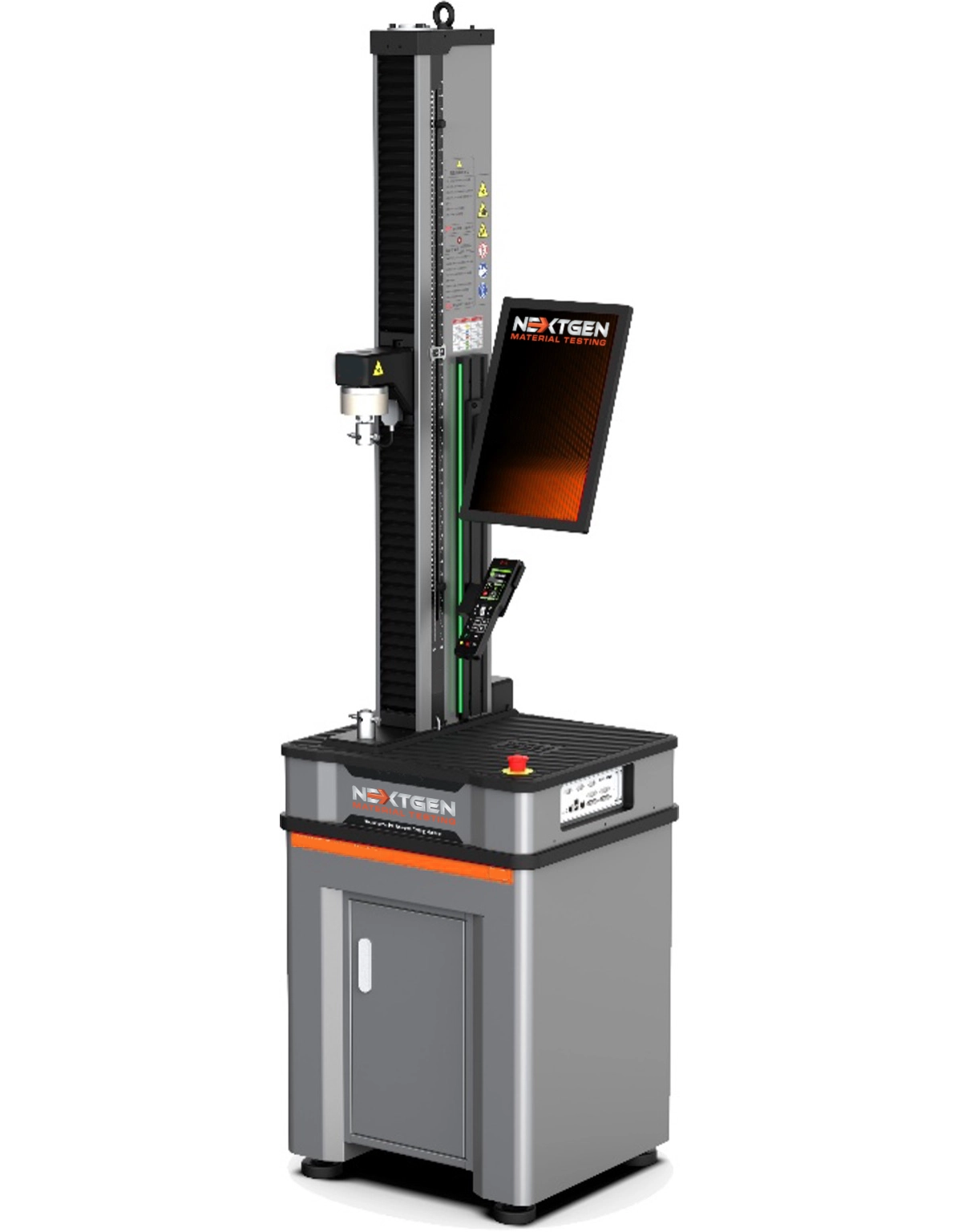
NG-EML Series A – Single Column Bench Top Universal Testing Machine (50 N – 5 kN)
The NG-EML Series A – Single Column Bench Top UTM (50 N–5 kN) is a precision electromechanical system designed for tension, compression, and flexural testing of low-force specimens. Featuring GenTest™ software, a high-speed servo drive, Class 0.5 accuracy, and USB/Ethernet control, this compact tabletop unit supports ASTM, ISO, and EN standards. Ideal for testing plastics, rubber, foams, films, composites, and thin metals.
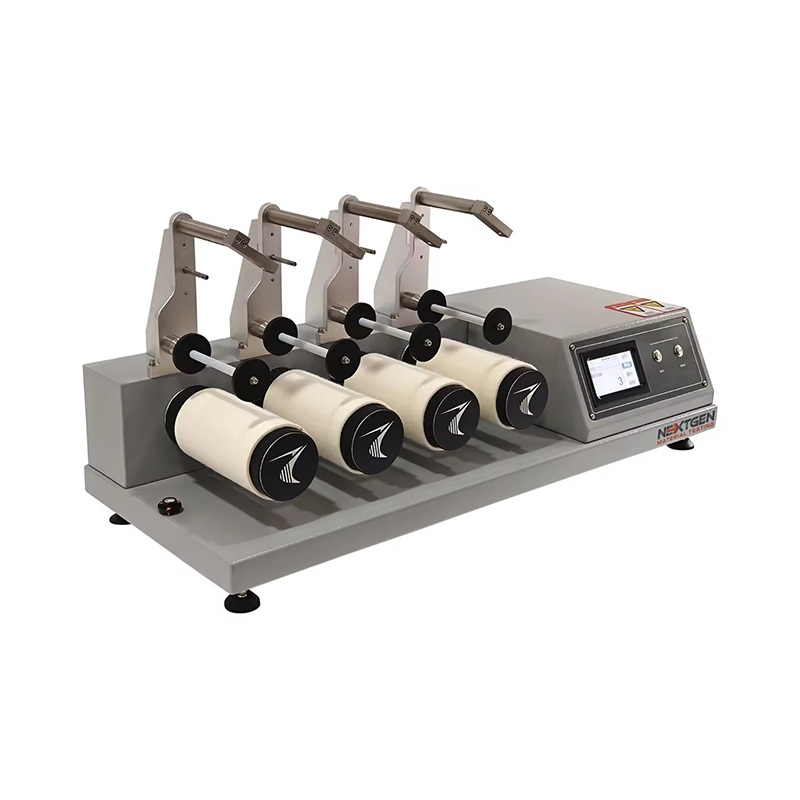
ICI / Mace Snag Tester
Discover the Fabric Textile ICI / Mace Snag Tester, a reliable tool for assessing fabric snagging under normal wear conditions.
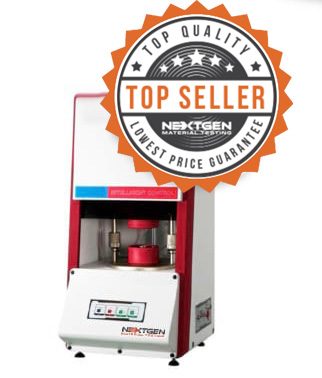
Moving Die Rheometer (MDR)
Introducing the NG-MDR Moving Die Rheometer, your solution for accurately assessing the curing and processing characteristics of vulcanized rubber compounds. Designed for precision, this state-of-the-art rheometer captures the characteristic curve and parameters of rubber vulcanization by measuring the torque applied to the oscillating die.
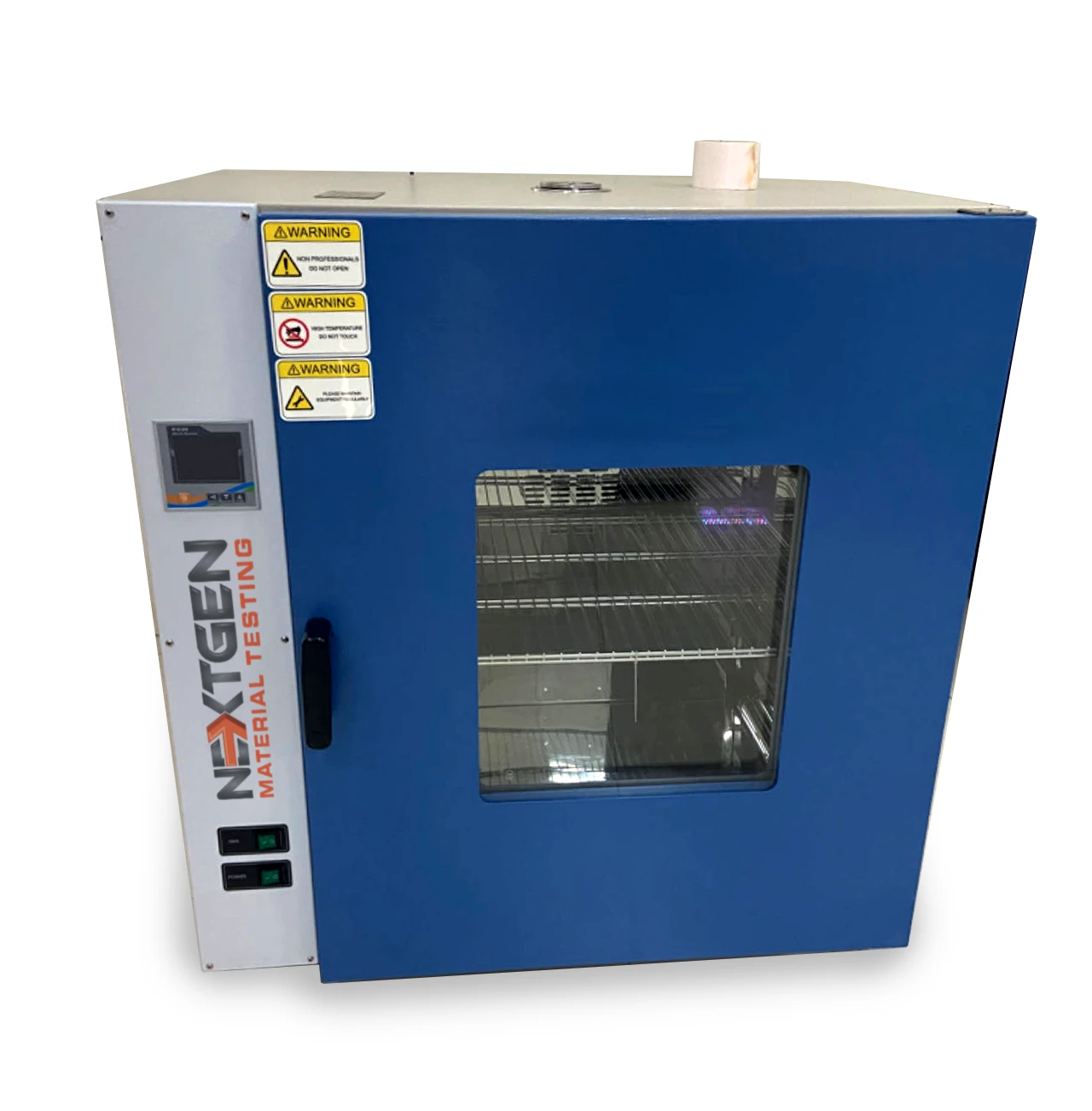
Aging Oven – High-Temperature Chamber – NG-AGOV-ADV
The NG-AGOV-ADV Aging Oven is designed for high-temperature testing of rubber, plastics, and insulating materials. It features programmable PID control, uniform airflow, and forced convection for stable and repeatable aging cycles. This system supports global testing standards including ISO 188, ASTM D573, and IEC 60216-4-1. With its durable stainless-steel chamber and user-friendly interface, it’s ideal for R&D, quality control, and certification labs.
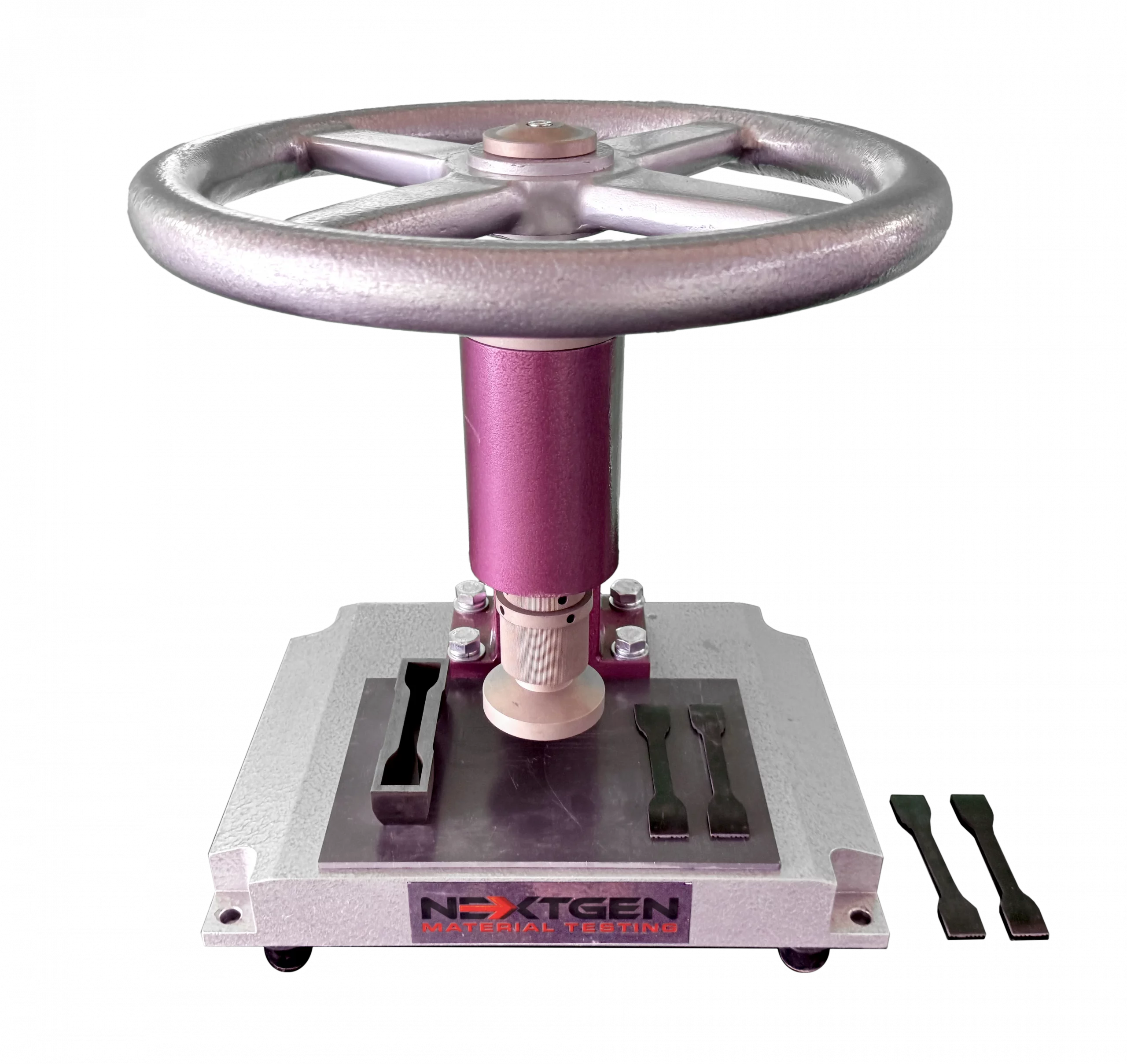
NG-T-Press M Series - Manual Cutting Press System for Rubber Tensile Specimens
Our newest manual cutting press system is suitable for laboratories to create specimens from rubber, tape, and special materials.
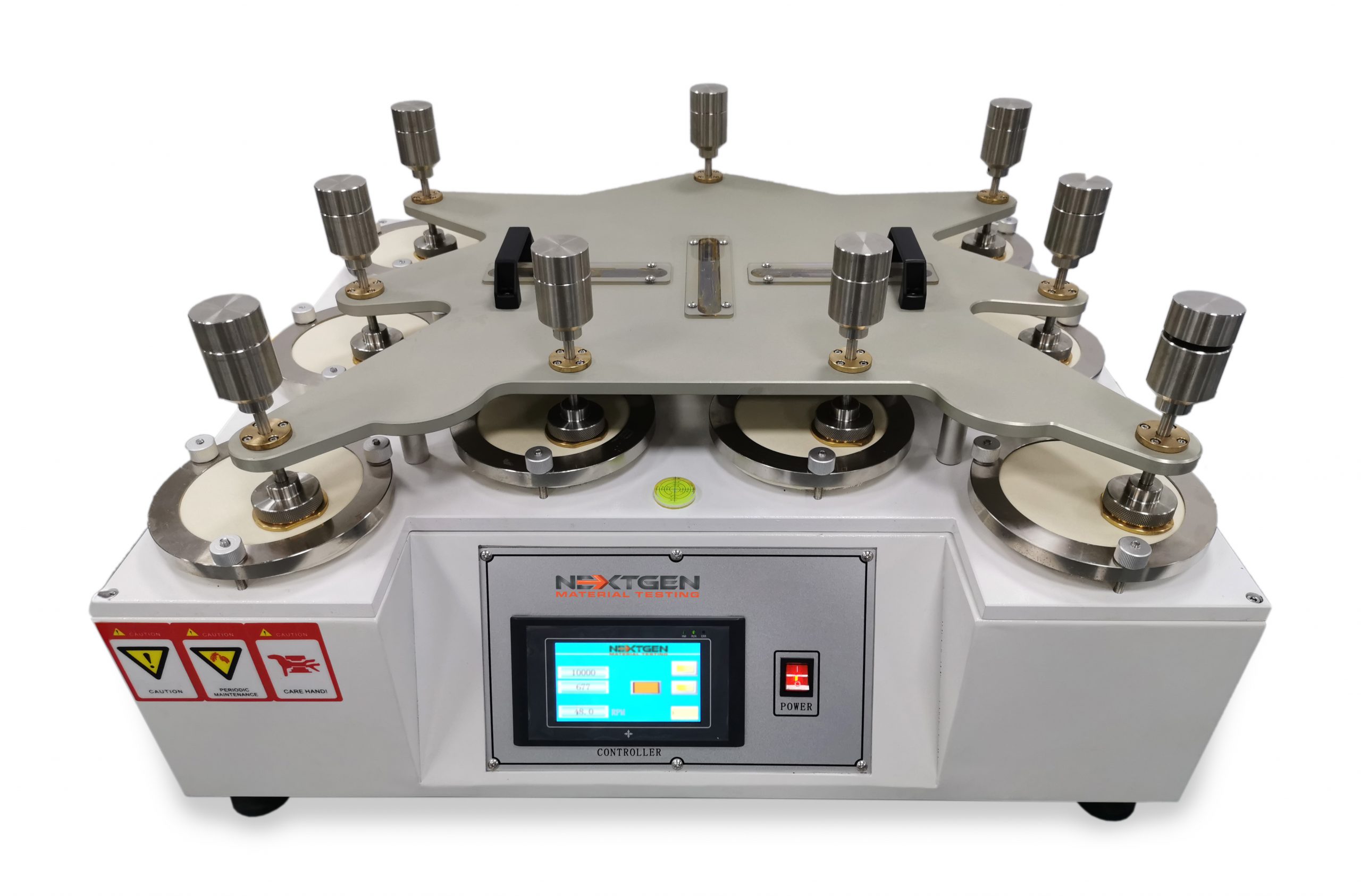
9-Station Martindale Abrasion Tester
The GenDale - Martindale Abrasion Tester is mainly used to test shoe fabric, shoe lining, and many other types of shoe related materials.
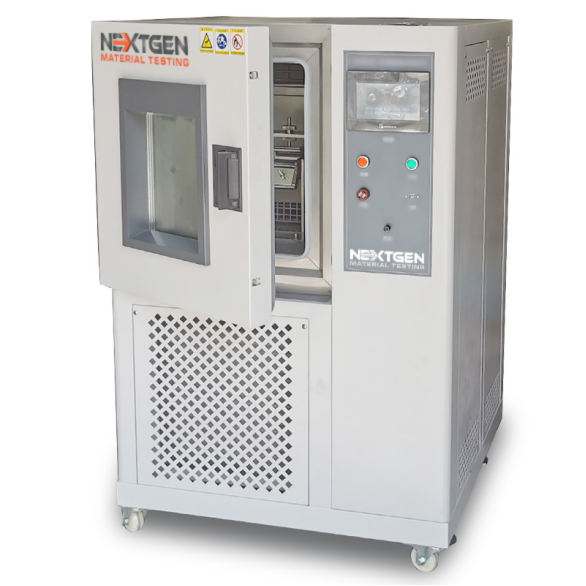
GenRoss-CH - Ross Flex Tester with Low Temperature Chamber
GenRoss-CH is an advanced Ross Flex Tester designed for assessing the cold resistance of materials in low temperature environments.

Linear Abrasion Tester
NextGen's linear abrasion meters evaluate the abrasion and scratch resistance of products, along with color transmission.
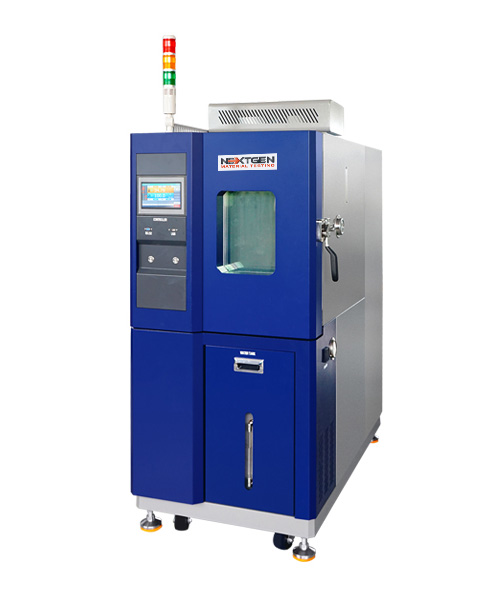
NextGen Environmental Chambers NG-EC 100,150,225,408,1000
The temperature and humidity NextGen Environmental Chambers features a sturdy cabinet made of cold-rolled steel and stainless steel.
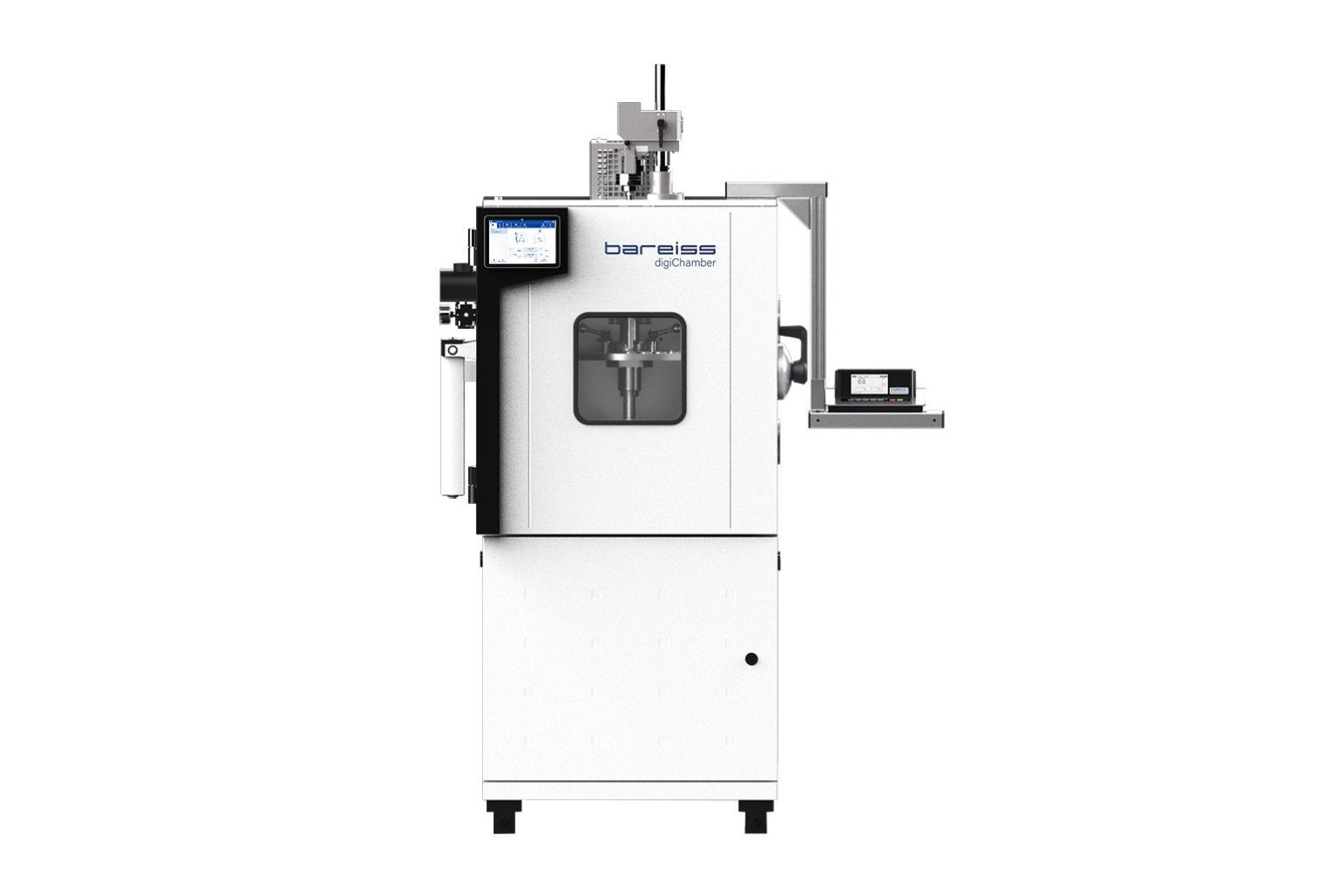
digiChamber - Temperature Controlled Hardness Testing
Discover digiChamber from NextGen Material Testing, the advanced temperature-controlled hardness tester developed by Bareiss.
